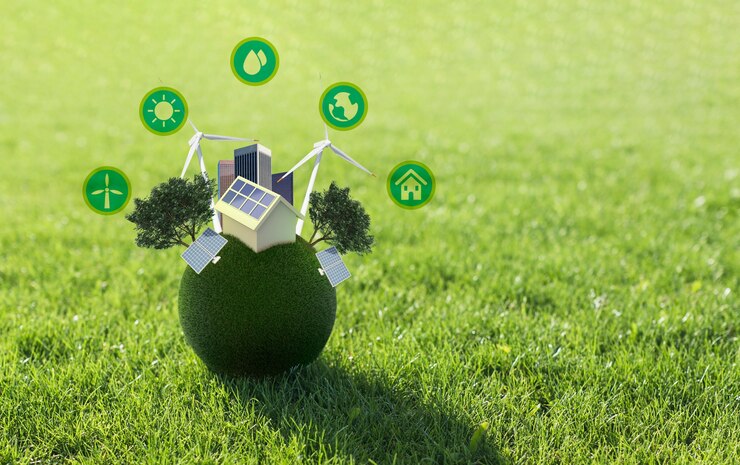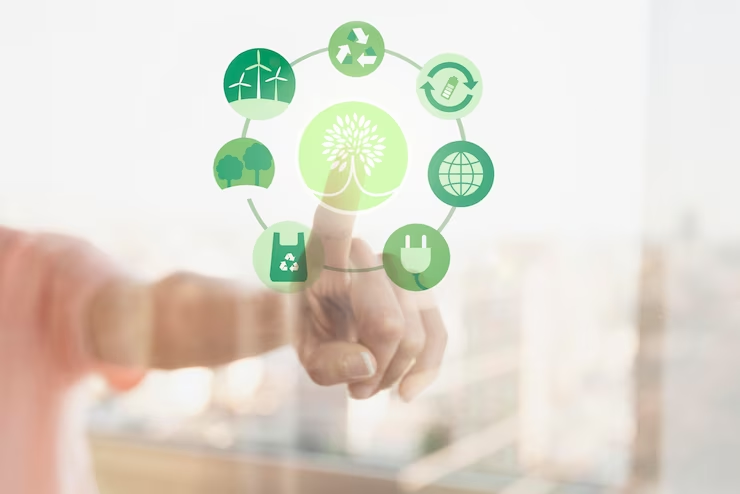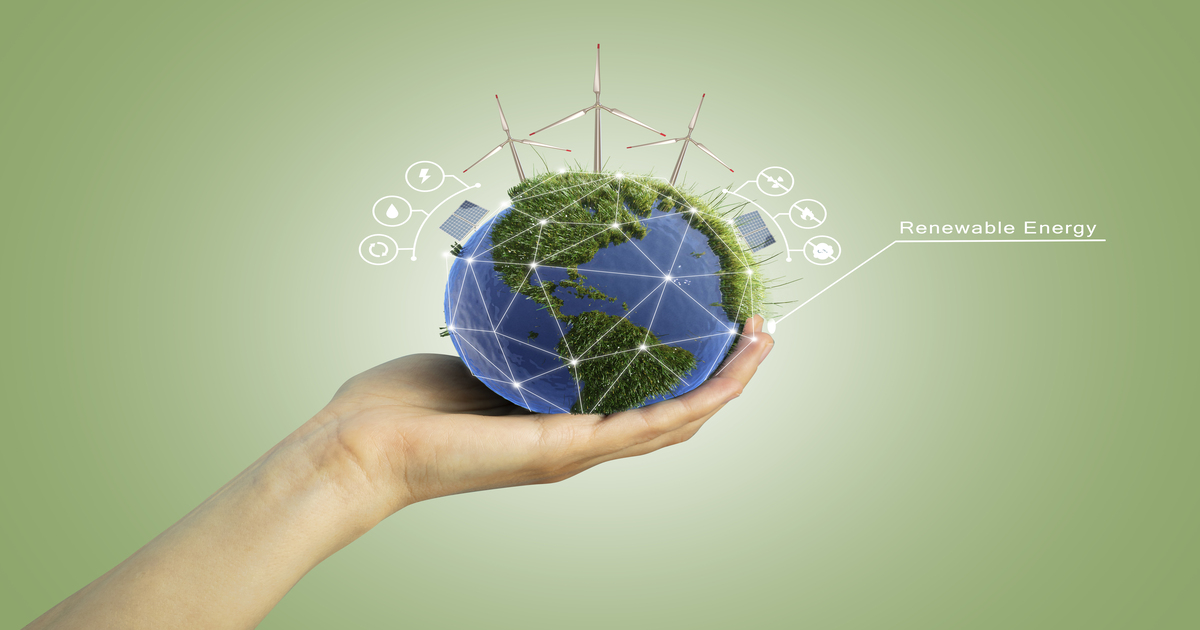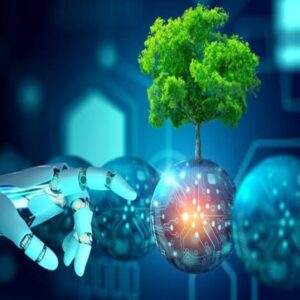Sustainable Future
Have you ever stopped to think about how technology has been a key player in transforming our world? It’s not just about shiny smartphones or autonomous cars; it’s about something much more significant—it’s about innovation with purpose. We are witnessing a revolution where technology not only advances but also commits to a broader purpose: creating a sustainable future.
The Impact of Technology on Sustainability
Technology, often criticized for its energy consumption and environmental impact, is reinventing itself to lead the way towards sustainability. Instead of being a problem, technology is emerging as a solution to the environmental challenges we face.
A clear example of this is the rise of renewable energies. Technology is driving the efficiency and affordability of sources such as solar and wind. More advanced energy storage systems are making it possible to consistently use these sources even when the sun isn’t shining or the wind isn’t blowing. Thus, the transition to a more sustainable energy matrix is becoming not only a possibility but a palpable reality.
Connecting the World for Change
Global connectivity is another crucial aspect of this revolution. Technology is breaking down barriers between nations, businesses, and individuals, facilitating global collaboration to address environmental challenges. Online platforms enable bright minds from around the world to come together to develop innovative solutions.
Open-source projects, for example, allow global communities to contribute ideas and code to develop sustainable technologies. This not only speeds up the innovation process but also creates a sense of shared responsibility for the health of the planet.

Innovation in the Small Details
It’s not just in large projects that we see technology shaping a sustainable future. Innovation is happening in the simplest and most everyday details of our lives.
Smart sensors, for example, are transforming resource management. They monitor the consumption of water, energy, and other resources, allowing for more efficient and conscious use. Advanced algorithms analyze this data to identify patterns and suggest adjustments to optimize consumption, thus reducing waste.
Similarly, the Internet of Things (IoT) is playing a crucial role in sustainable agriculture. Connected agricultural sensors monitor soil conditions, predict weather patterns, and optimize the use of inputs. This not only increases production efficiency but also reduces the environmental footprint of agriculture.
The Importance of Technological Education
To sustain this revolution, investing in technological education is essential. As technology becomes more complex, understanding its basic principles becomes crucial for creating sustainable solutions.
Educational programs that promote digital literacy and an understanding of technological concepts from childhood are fundamental. Today’s youth will be tomorrow’s innovators, and empowering them with the necessary knowledge is an investment in the sustainable future of our planet.
Challenges and Opportunities
Of course, this journey toward a sustainable future with the help of technology is not without challenges. The issue of cybersecurity, for example, becomes even more critical as we become more dependent on technology to manage fundamental aspects of our lives.
Additionally, the digital divide must be addressed to ensure that everyone, regardless of their location or socio-economic status, has equal access to the opportunities that technology offers. Digital inclusion is crucial to prevent the creation of divided societies between those who have access to innovations and those who are left behind.
Overcoming Adversity: Navigating the Ethical Landscape
As we celebrate the strides made in the symbiotic relationship between technology and sustainability, we must not overlook the ethical considerations that accompany this journey. The ethical landscape of technological innovation is complex and requires careful navigation.
One ethical concern is the potential misuse of powerful technologies. Artificial intelligence, for instance, brings incredible capabilities, but without proper safeguards, it could lead to unintended consequences. Ensuring that ethical guidelines are embedded in the development and deployment of these technologies is imperative.
Moreover, the issue of electronic waste (e-waste) looms large. As our gadgets become obsolete at an alarming rate, responsible disposal and recycling of electronic devices are essential. Sustainable design practices and the incorporation of recyclable materials are steps in the right direction, promoting a circular economy where resources are reused rather than discarded.

The Role of Corporate Responsibility
Corporate responsibility plays a pivotal role in driving the nexus between technology and sustainability. Companies are increasingly recognizing the importance of aligning their strategies with environmental goals. From eco-friendly manufacturing processes to reducing carbon footprints, businesses are embracing sustainability as a core value.
Investors are also scrutinizing companies’ environmental, social, and governance (ESG) practices, pushing for transparency and responsible business conduct. This paradigm shift towards sustainable practices not only benefits the planet but also enhances brand reputation and financial performance.
Fostering Innovation through Collaboration
The road to a sustainable future requires collaboration on a global scale. Governments, businesses, academia, and civil society must work hand in hand to address the multifaceted challenges ahead. Policies that incentivize green technologies, support research and development in sustainable solutions, and promote international cooperation are essential.
Open collaboration platforms, where knowledge is shared freely, can accelerate progress. The idea is not just to compete but to collectively innovate for the greater good. In this era of interconnectedness, a breakthrough in one corner of the world can have cascading effects globally.
Education as a Catalyst for Change
Education remains a cornerstone in shaping a sustainable future through technology. Beyond technical skills, fostering a mindset of sustainability and ethical responsibility is crucial. Encouraging interdisciplinary education that combines technology with environmental sciences, ethics, and social responsibility can produce well-rounded professionals equipped to tackle the challenges of tomorrow.
Initiatives that promote STEM (science, technology, engineering, and mathematics) education with a focus on sustainability can empower individuals to become catalysts for change. By instilling a sense of responsibility and ethical awareness in future generations, we lay the foundation for a society that values innovation with purpose.
Looking Ahead: A Call to Action
In conclusion, the marriage of technology and sustainability is not a mere trend; it is an imperative for the survival of our planet. As we bask in the glow of technological advancements, let us not forget the responsibility that comes with this power.
Each of us has a part to fulfill in this expedition. Whether as consumers making conscious choices, professionals developing innovative solutions, or policymakers shaping the regulatory landscape, we contribute to the collective effort of creating a sustainable future.
It is a call to action for governments to enact policies that encourage sustainable practices, for businesses to prioritize ethical and environmentally conscious strategies, and for individuals to embrace a Perspective that prioritizes the enduring welfare over immediate profits.
In the grand tapestry of progress, the thread of sustainability must weave seamlessly with technology. By doing so, we ensure that the innovations of today do not compromise the possibilities of tomorrow. In this symphony of innovation with purpose, we hold the conductor’s baton, shaping a future harmonized by the responsible use of technology, where progress is not just measured in gigabytes and teraflops but in the resilience of our planet and the well-being of its inhabitants.
As we march forward into this era of unprecedented possibilities, let us carry the torch of innovation with purpose high, illuminating a path towards a sustainable future where technology serves as a guiding light for the well-being of future generations.
Did you like this topic? See more content about: sustainability
SOURCE: euro news





